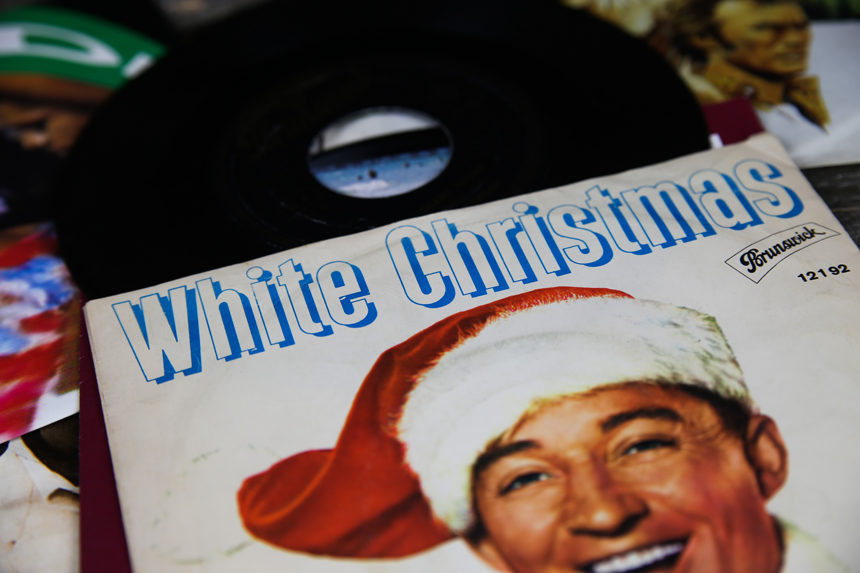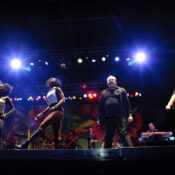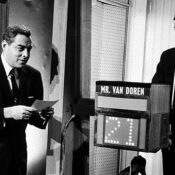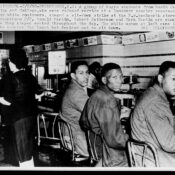This series by American studies professor Ben Railton explores the connections between America’s past and present.
If there’s a creepier line in songwriting history than “He sees you when you’re sleeping/He knows when you’re awake,” I haven’t found it. Sinister surveillance Santa is one hell of an image to be joyfully singing to our kiddos. Also: “Bring us some figgy pudding and bring it right here…we won’t go until we get some” — why are these deceptively jolly carolers taking our night hostage unless we concede to their precise dessert demands? And don’t even get me started on how “all of the other reindeer” only stop their “reindeer games” — their relentless bullying of Rudolph’s visible difference, that is — when he proves useful to them.
Christmas songs have more layers of meaning than we sometimes realize, is what I’m saying. And it’s not only their lyrics and themes that merit a second look —many of our holiday classics feature compelling stories that have a lot to tell us about American history, pop culture, and some of the most moving reasons for the season.
Two of those classics trace back to before the Civil War and connect to the competing ideologies that led directly to that conflict. The origin point for “Jingle Bells” is often located with jazz legend Benny Goodman and his orchestra’s justifiably famous 1935 recording of the song. But the lyrics to “Jingle Bells” date back far further, to James Lord Pierpont’s 1857 song “The One Horse Open Sleigh.” That song was first performed at a church concert in Savannah, Georgia, the Southern city to which the New Hampshire-born Pierpont had moved — and where, just a few years later, he would join the Confederate army and write martial songs like “Strike for the South!” and “We Conquer or Die” to the sounds of which he and his fellow Confederates marched into battle. I don’t imagine they were laughing all the way, but hey.
Benny Goodman’s “Jingle Bells” (uploaded to YouTube by Benny Goodman – Topic/Legacy Recordings)
Pierpont’s “The One Horse Open Sleigh” (uploaded to YouTube by Andrea Scalia – Early Music)
Definitely not laughing was Pierpont’s abolitionist father, Reverend John Pierpont, who despite his advanced age served as chaplain for the 22nd Massachusetts Infantry. In 1855, just two years before Pierpont would compose “Sleigh,” another ardent New England abolitionist, the transcendentalist activist and educator John Sullivan Dwight, adapted the French Christmas Carol “Cantique de Noël” into the English song “O Holy Night.” Dwight was particularly struck by the song’s third verse, which after his translation became an anthem and rallying cry for the abolitionist movement as a whole: “Truly He taught us to love one another/His law is love and His Gospel is peace/Chains shall He break for the slave is our brother/And in His name all oppression shall cease.”
“O Holy Night” sung by Mahalia Jackson (uploaded to YouTube by Mahalia Jackson – Topic/Columbia)
Turning to the 20th century, one of its most famous and successful Christmas songs has its own compelling connection to war and peace. Bing Crosby’s recording of legendary songwriter Irving Berlin’s “White Christmas” is nothing short of the best-selling single of all time, having moved more than 50 million copies worldwide (when we include the numerous covers that have been released since, the song has sold well north of 100 million copies). Berlin seemed to know immediately that he had struck songwriting gold — he originally penned the song in 1940, and supposedly told his secretary at the time, “I want you to take down a song I wrote over the weekend. Not only is it the best song I ever wrote, it’s the best song anybody ever wrote.”
Crosby’s version of “White Christmas” is usually associated with the 1942 musical film Holiday Inn (starring Crosby and Fred Astaire), for which it was recorded and went on to win an Academy Award for Best Original Song (presented at the ceremony by Berlin himself!). But the song was first performed by Crosby a year earlier, on a live NBC Radio Christmas Day show in December 1941. That was less than three weeks after the Pearl Harbor attack and just two weeks after the U.S. had entered World War II against both Japan and Germany, a somber moment on which that Christmas Day radio show was centered. And there’s no doubt that “White Christmas,” with both its nostalgic dreams of a more peaceful past and its hopes for a better future, resonated with that wartime moment and audience in powerful ways that made it an immediate and enduring holiday favorite.
“White Christmas” sung by Bing Crosby and Frank Sinatra in the movie White Christmas (uploaded to YouTube by Mercury Blue)
Here in the 21st century we have no shortage of conflicts and crises of our own, of course, and a pair of wonderful Hanukkah songs (with apologies to Adam Sandler, it turns out we’ve got plenty of Hanukkah classics, past and present!) can help us transcend them. The ongoing conflicts between Israel and Palestine can seem like one of the world’s most entrenched and unchanging battles, but in his 2011 song “Miracle,” the Jewish American rapper and reggae artist Matisyahu uses Hanukkah’s miraculous story and moving symbolism to imagine the possibility of modern-day miracles of peace and light. “Said eight nights and eight lights/End these fights, keep me right/And bless me to the highest heights with your miracles,” indeed.
“Miracle” by Matisyahu (uploaded to YouTube by Matisyahu)
One of 2022’s most frustrating unfolding stories has been the return of virulent anti-Semitism, some of it espoused and amplified by Black celebrities like Kyrie Irving and Kanye West. So it’s a vital moment to remember the foundational histories of solidarity and alliance between the African American and Jewish communities, and there’s a Hanukkah song to help us do so: Sharon Jones & the Dap-Kings’ “8 Days (of Hanukkah)” (2015). Jones, a former corrections officer turned gospel singer, was a powerful and inspirational force whom we lost far too young just a year after that song was released. But her legacies live on, and her choice to include this Hanukkah track on her last album It’s a Holiday Soul Party exemplifies the truest meanings of holiday classics and the season.
“8 Days (of Hanukkah)” by Sharon Jones and the Dap Kings (uploaded to YouTube by NPR Music)
Become a Saturday Evening Post member and enjoy unlimited access. Subscribe now



